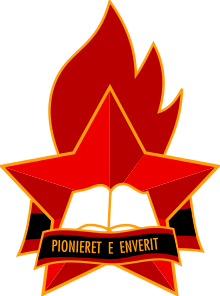Pioneers of Enver

The Pioneers of Enver (Albanian: Pionierët e Enverit, literally The Pioneers of Enver Hoxha), was a pioneer movement functioning in Albania during its communist period. Formed as Debatik, an acronym for United Boys of Communist Ideas (Albanian: Djem të Bashkuar të Ideve Komuniste) in February 10, 1942, and continued as The pioneers organization (Albanian: Organizata e Pionierëve) after World War II, it was supervised by the Labour Youth Union of Albania, the youth wing of the Party of Labour of Albania.
History
The organization started as Debatik, an acronym for United Boys of Communist Ideas (Albanian: Djem të Bashkuar të Ideve Komuniste) in February 10, 1942, and continued as The pioneers organization (Albanian: Organizata e Pionierëve) after World War II. In 1985, after the death of the communist leader Enver Hoxha, it was renamed as Pioneers of Enver (Albanian: Pionierët e Enverit, literally The Pioneers of Enver Hoxha). It effectively ended with the fall of communistm in Albania in 1991.
The association created activities for children up to 14 years old, was in charge of the summer Pioneer camps of Albania, organized the pioneers palaces and their yearly national music, language, literature, and painting competitions, and published three magazines, the scientific Horizonti, and the two, more generalistic, Pionieri,[1] and Yllka, respectively for ages 8–14 and 6-8.
The organization affected the school life and the academic development of children. Children, at their 8th or 9th year of age, needed to say a sermon in order to be accepted in the organization. The organization within a school would hold elections among them to choose the children school leaders.
In media
Debatik, a 1961 movie, is a fictional production, dedicated to the creation of the organization in 1942. Guximtarët, a 1970 movie, describes pioneer summer camps and pioneer mountaineering. Shoku ynë Tili, a 1981 production, described how the organization would affect children's lives academically and socially.
References
- ↑ Top Channel (21 January 2014). "Revistat që bënë histori".